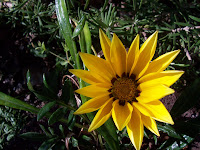
Have you ever seen a Qur'an with a picture on the cover? It has a picture of Masjid al Aqsa on the front cover, and the Dome of the Rock on the back cover. "Mushaf Masjid al Aqsa" is written on the cover, in calligraphy that is difficult for me to read. This Qur'an with it's shiny cover with a picture on it looks so different from every other Qur'an I have seen, that I don't think it is immediately obvious that it is a Qur'an.
 My kids noticed that the script in it is a little larger than the Qur'an I use, so they handed it over to me. I am always looking for one with big script since I often read a little bit with out my glasses right after prayers. I am just learning Arabic; don't think I am good at it. The printing is nice. There was also a prayer rug that is padded, which my kids also immediately handed over to me, since I have trouble with my knees. My goodness I sound old! Padded prayer rugs and large print Qur'ans.
My kids noticed that the script in it is a little larger than the Qur'an I use, so they handed it over to me. I am always looking for one with big script since I often read a little bit with out my glasses right after prayers. I am just learning Arabic; don't think I am good at it. The printing is nice. There was also a prayer rug that is padded, which my kids also immediately handed over to me, since I have trouble with my knees. My goodness I sound old! Padded prayer rugs and large print Qur'ans.



















































